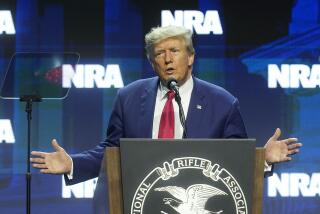The Next Casualty: Bill of Rights?
Tuesday’s onslaughts on the World Trade Center and the Pentagon are being likened to Pearl Harbor. The comparison is just. The attacks were near miracles of logistical calculation, timing, execution and devastation inflicted on the targets.
There may be another similarity. The possibility of a Japanese attack in early December 1941 was known to U.S. naval intelligence and to President Roosevelt. On Tuesday, derision at the failure of U.S. intelligence was widespread. The Washington Post quoted an unnamed top official at the National Security Council as saying, “We don’t know anything here. We’re watching CNN too.” Are we to believe that the $30-billion annual intelligence budget, immense electronic eavesdropping capacity, thousands of agents around the world, produced nothing in the way of a warning?
In fact, the editor of the London-based Al-Quds al-Arabi newspaper, said he heard three weeks ago that Osama bin Laden, now the prime suspect, planned “very, very big attacks against American interests.”
The lust for retaliation traditionally outstrips precision in identifying the actual assailant. By early evening Tuesday, the U.S. national security establishment was calling for removal of all impediments on the assassination of foreign leaders. Led by President Bush, they were endorsing the prospect of attacks not just on the perpetrators but on those who might have harbored them. From the nuclear priesthood comes the demand that mini-nukes be deployed on a preemptive basis against the enemies of America.
The targets abroad will be all the usual suspects--the Taliban or Saddam Hussein, who started off as creatures of U.S. intelligence. The target at home will be the Bill of Rights.
Less than a week ago the FBI raided Infocom, the Texas-based Web host for Muslim groups such as the Council on Islamic Relations, the Islamic Society of North America, the Islamic Assn. for Palestine and the Holy Land Foundation. Palestinians have been denied visas, and those in this country can, under the terms of the counterterrorism policy during the Clinton years, be held and expelled without due process.
Tuesday’s explosions were not an hour old before terror pundits such as Anthony Cordesman, Wesley Clark, Robert Gates and Lawrence Eagleburger were saying that these attacks had been possible “because America is a democracy,” adding that now some democratic perquisites might have to be abandoned. What might this mean? Increased domestic snooping by U.S. law enforcement and intelligence agencies? Ethnic profiling? A national ID card system?
Tuesday did not offer a flattering exhibition of America’s leaders. President Bush gave a timid and stilted initial reaction in Sarasota, Fla., then disappeared for an hour before resurfacing in at a base in Barksdale, La., where he gave another flaccid address with every appearance of being on tranquilizers. He was then flown to a bunker in Nebraska, before someone finally had the wit to suggest that the best place for the U.S. president at time of national emergency is the Oval Office.
One certain beneficiary of the attacks is Israel. Polls had been showing popular dislike here for Israel’s recent tactics, which may have been the motivation for Colin Powell’s few bleats of reproof to Israel. We will be hearing no such bleats in the weeks to come, as Israel’s leaders advise the U.S. how exactly to deal with Muslims.
“Freedom,” said Bush in Sarasota, “was attacked this morning by a faceless coward.” That properly represents the stupidity and blindness of almost all of Tuesday’s mainstream political commentary. By contrast, the commentary on economic consequences was informative and sophisticated. Worst hit: the insurance industry. Likely outfall in the short term: higher energy prices, a further drop in global stock markets. Bush will have no trouble in raiding the famous lock-box, using Social Security trust funds to give more money to the Defense Department.
Three planes are successfully steered into three of America’s most conspicuous buildings and America’s response will be to put more money in missile defense as a way of bolstering the economy.
*
Alexander Cockburn writes for the Nation and other publications.
More to Read
Sign up for Essential California
The most important California stories and recommendations in your inbox every morning.
You may occasionally receive promotional content from the Los Angeles Times.










